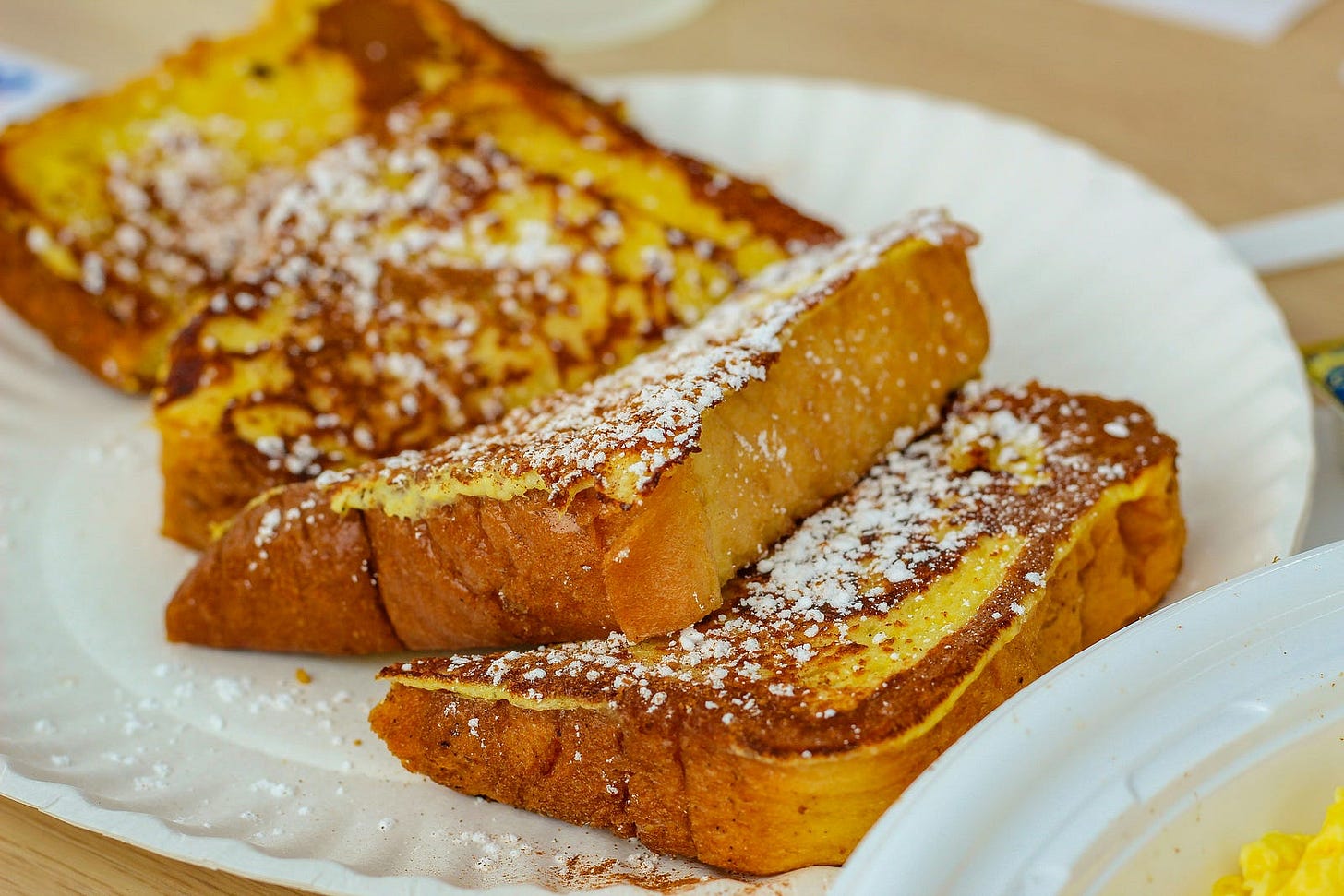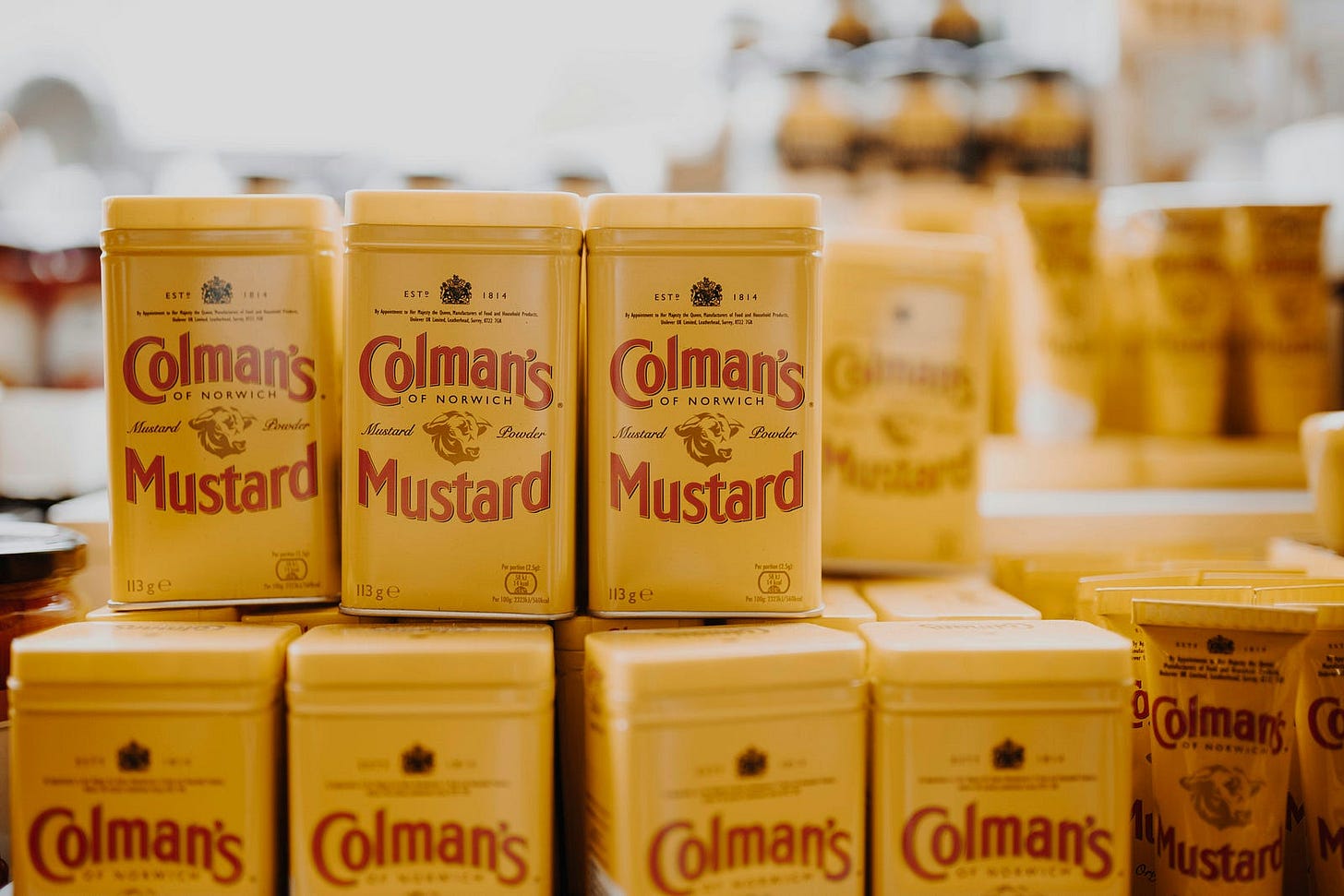Why Are French Fries called ‘French’?
The World’s Love for French Gastronomy and its Terminology
If you enjoyed this post, please like it, restack it, and share it with your friends. It only takes a few clicks! Your support will help me reach new readers.
Have you ever wondered how your food got its name?
The origin of words is interesting part of language. It is even more interesting when we learn about words that are not in our mother tongue.
I am French and French is my mother tongue. Learning English has been a rewarding process that has challenged my understanding not only of the English-speaking world but also of my own country: France.
One thing that surprised me was the influence of French culture on the words English speakers use to refer to food. While there are plenty of examples, perhaps the most surprising of all are foods labeled as ‘French’ when they have, at least in their origin, little to do with France.
In this story, I want to take a look and the origin and histories of three such foods:
‘French’ fries
‘French’ toast
‘French’ mustard
Your French Fries or My French Fries?
Like a lot of people, I love French fries; and, like a lot of people, I probably love them too much. But the thing is, as a native French speaker, the first time I heard the word ‘French fries’, I didn’t understand what the other person was talking about.
The reason is simple. In French, there is no ‘French fries’. We have ‘des frites’ (fries, usually in the plural) which can be said to be essentially the same thing. But why do Americans add ‘French’ to the name of the food?
As the story goes the dish was discovered by American soldiers in Belgium during World War I. Since French is the most spoken language in southern Belgium, they named these tasty potatoes ‘French fries’.
However, after doing more research I discovered that, contrary to this story, the word ‘French fries’ existed in English before World War I and was in use at the end of the 19th century.
The origin of les frites (i.e. French fries) remains controversial. Some say they come from Belgium, others from France, and some hypothesize that they come from Spain. There is certainly a culinary nationalistic battle going on over who created this now world-famous food.
One thing is for sure, the ‘frietmuseum’ (yes, that is a fries museum) is not in France, but in Belgium.
However, they are not ‘French fries’. They are simply fried potatoes. The production process of them can vary slightly from place to place or family to family. Yes, from one family to another, because in France, fries are a family dish; often made at home from a family recipe.
So it seems as if a kind of confusion is responsible for the naming of the dish. Americans, a bit wrongly perhaps, came to associate what the French call les frites with being ‘French’ and the name stuck.
This is even more surprising because it has not happened with other languages. For example, the Japanese do not call this dish ‘French’. They say furaido poteto (フライドポテト), which literally means ‘fried potatoes’ and more accurately reflects what they are.
‘French’ Toast is Not Only French
Another food wrongly attributed to my home country is ‘French toast’. The association with France goes even beyond the English language. Where I live now, in Japan, it is called furenchi tōsuto フレンチトースト, which means it is called ‘French’ just like in English.
While I have come to enjoy ‘French toast’, this dish has even less to do with France than French fries. The recipe is thought to have originated in ancient Rome; before there even was a country called France. The first record we have of a similar dish is included in the Apicius, a first-century A.D. cookbook of ancient Roman cuisine.
In more modern times, a culinary book published around 1300 called Le Viandier, attributed to the French chef Guillaume Taillevent, presented a recipe for toasted bread with eggs and sugar. This book would come to be one of the most famous reference works on medieval French cuisine.
However, similar recipes can be found across Europe, albeit under various names. So it would be hard to attribute even a modern-day version of the dish to the French.
In French, of course, we do not say ‘French toast’, but ‘pain perdu’, which means ‘lost bread’. Like French fries, it is a family dish, but mostly for an after-school snack. It is a dish prepared for children using stale (i.e., ‘lost’) bread that would otherwise be inedible.
French toast is probably called ‘French’ because English and American cooks liked to look up the recipe in French cookbooks. French cuisine is particularly popular and highly regarded in English-speaking countries. It probably contributes to the popularity of this dish even in culturally and geographically distant countries such as Japan.
Today, this love of French cooking means you can eat ‘French toast’ all over the world. Recipes for it have continued to evolve, even including ice cream and other (unhealthy) pleasures of modern cooking.
Don’t Forget the ‘French’ Mustard
The history of mustard is often associated with France. However, mustard seeds have long been used and cultivated in various regions of the world. In fact, they are not even native to France. The seeds themselves were probably first brought to Gaul (modern-day France) by the Romans as they expanded their empire.
The city of Dijon, today often synonymous with mustard, refined the techniques of making this condiment in the Middle Ages and developed their own original version of mustard. This type became famous for its unique flavor; which included using local verjuice or white wine.
However, the foundation of what became known as French mustard came from much older, non-French influences. Furthermore, while French mustard is often considered the most prestigious variety, other regions, including Germany and England, also produced high-grade mustard.
Today, while mustard is emblematic of French cuisine, the notion that it is French overlooks its broader historical and geographical journey. In other words, French mustard is not French per se, but a condiment deeply connected to European history and culture.
Since the most famous recipe is the one from Dijon, it would be more accurate to call it ‘Dijon mustard’ rather than ‘French mustard’. In fact, it is often labeled as ‘Dijon mustard’ which is nice to see. Now, if only English speakers would call it that instead.
Conclusion: French Cuisine is a blend of cultures
There are certainly some words that came into English, as well as other languages, from French culture. Some of them remain marked by French by such things as spelling or pronunciation that reflect the history of the words.
In some cases, as in the examples of ‘French fries’, ‘French toast’, and ‘French mustard’, the products themselves are called French not to indicate their primary origin as many would think, but as a symbol of France’s cultural connection with the English-speaking world.
As for me, I can say that learning English, like learning Japanese, contributes greatly to deepening my understanding of my own French culture as well as its connections with countries all over the world.
Through my study of English, I have come to learn that what is now considered French cuisine is an amalgamation of several European culinary traditions. French cuisine has been influenced by many cultures, especially through trade, colonization, and regional diversity.
For example, pasta (Italy) and couscous (North Africa) have a strong presence in French homes today despite their foreign origin. However, French cuisine has also developed its own strong identity and culinary traditions that are internationally recognized.
This shows that not words we use to talk about foods, but the foods themselves reflect the fusion of different cultures in everyday life.
Bon appétit !
If you are entertained, challenged, or informed by my words, please do not hesitate to become a paid subscriber to Philosopher’s Insight. You will get access to every post in my archive and be able to discuss various topics in the chat room. It will also support my writing on Substack.







Truth be told, potatoes come from the Andes mountains in South America. It wasn't widely adopted in Europe until the 18th century.
https://untoday.org/the-potato-a-journey-through-time-cultures-and-challenges/
Making "French fries" requires good oil. Traditionally, olive oil is one of the best cooking oils. While not popular in Paris, roasting various vegetables with olive oil is common in Provencal cuisine. Truth be told, a lot of Provencal cuisine shares a lot with Greek cuisine. Olives and olive oil are originally from Greece and were brought to Southern France about 3000 years ago.
Greeks have their own version of "French fries". Since theirs is always made with olive oil and a dash of salt and lemon, I prefer this version of "French fries".
https://adhc.lib.ua.edu/globalfoodways/from-massalia-to-marseille-how-the-ancient-greeks-influenced-provencal-cuisine/
While potatoes where not common in European cuisine until the 18th century, the pan roasting of root vegetables such as turnips in oil or fat has been common for millennia.
While Americans may have adopted "French fries" from Belgium, they could just as likely have come across them in Southern France. But, as I said, the best "French fries" are made with olive oil, which ultimately, comes from Greece.
On my first visit to Belgium, I was "educated" by many that French fries originated in Belgium and not France and that the Belgian fries were much better. Like yours, my research found no evidence of the first claim. It didn't need more research than a couple of restaurant meals to disprove the second claim.